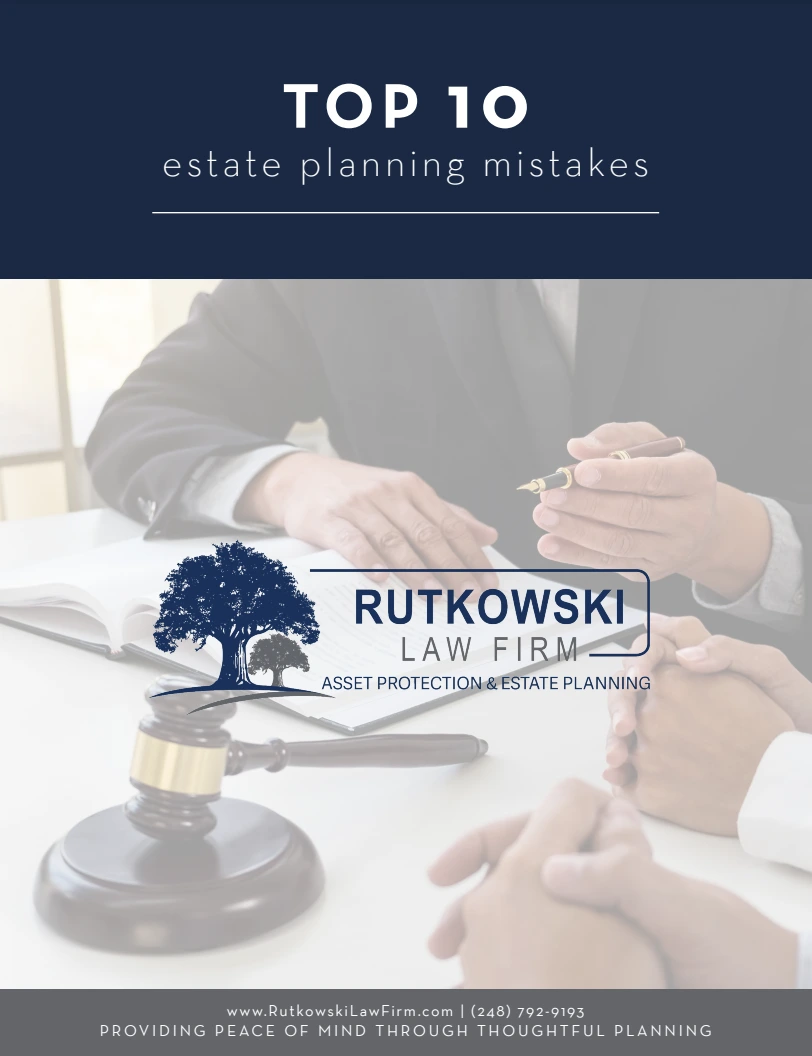 Asset Protection
Asset ProtectionShield your Michigan home, savings, and investments from unnecessary risk with proactive legal strategies.
Explore Asset ProtectionWhy Estate Planning Matters in Michigan
Estate planning is about making decisions today so your loved ones are protected tomorrow. In Michigan, that means planning for probate, Medicaid eligibility, and your family’s unique needs. At Rutkowski Law Firm, we meet families where they are—whether planning ahead or facing a crisis—so you can preserve your wishes and protect what matters most.

Highly recommend, fair cost for excellent estate plan. The firm set-up our Trusts and Will in 2018 with one of the attorneys at an affordable cost for a very comprehensive documents. Just had the 2nd follow up review (at no costs) with Mike Rutkowski who was very thorough and clear in addressing all our questions and concerns. The documents created initially was so robust that no legal updates needed yet so far since no changes in beneficiaries took place. "Normal" future family changes (additional kids and grand children) were predicted and covered that made maintaining the document is relatively easy and at no additional cost. Also been getting news letters that keep me educated of estate planning related topics. Thank you Mike for helping us protecting our family's future when we can no longer do it. Appreciate you.
Very professional and supportive as I moved through the estate planning process. Great communication and very easy to work with. They were upfront about the fee schedule. I highly recommend this firm.

How Michigan Law Affects Your Estate Plan
Estate planning rules vary by state. In Michigan, probate, deeds, and medical decision-making have unique requirements. We translate the legal fine print into plain English so your plan actually works when your family needs it. For hands-on help, see our Estate Planning Services.

The Building Blocks of a Michigan Estate Plan
A complete Michigan estate plan protects your family’s future with the right documents — tailored to state law and your goals. Explore how Wills, Trusts, Powers of Attorney, Patient Advocate Designations, and Lady Bird Deeds work together to prevent probate headaches and keep decision-makers empowered. Learn more on our Estate Planning Services page.
Will vs. Trust: Which Is Right for Your Michigan Estate?
Both Wills and Trusts are common in Michigan — they just solve different problems. Many families use both to balance simplicity, privacy, and probate avoidance. If you’re deciding which route to take, our Estate Planning Services page explains how we tailor each option.
Will: Distributes assets through probate after death
Trust: Manages and distributes assets during life and after death without probate
Will: Public record after death
Trust: Private and confidential
Will: Limited impact until death
Trust: Allows management of assets if incapacitated
Will: Simple to create but less control
Trust: More customizable but requires maintenance
Will: Simple estates and straightforward distributions
Trust: Families wanting privacy, control, or asset protection

When Should Michigan Families Start Estate Planning?
The right time is before life gets complicated. Whether you’re buying a first home in Rochester, relocating to Bloomfield Hills, welcoming a child, nearing retirement, or updating after a move to Michigan, proactive planning gives your family security, flexibility, and peace of mind.

Estate Planning for Health, Family & Legacy in Michigan
True estate planning isn’t just about money — it’s about your people. We protect your wishes and reduce stress with documents your family and Michigan institutions will actually accept. Explore service options on our Estate Planning Services page.
Estate Planning is an essential process that will protect your assets and ensure you’re your estate is distributed according to your wishes after your death.
Many people make mistakes when creating their estate plan, which can lead to unnecessary stress, confusion, and costly legal battles for their loved ones. Below, our estate planning team put together the top 10 and most common mistakes we see in estate planning.

A quick January check could prevent costly estate planning mistakes down the line.

Founder / Attorney
Life doesn’t stay the same — and neither should your estate plan.

Founder / Attorney
A compassionate approach can open doors—not battles—when it comes to planning.

Founder / Attorney
Learn the ins and outs of estate planning from the estate planning attorney, Michael Rutkowski.

Cryptocurrency can't be titled in a trust, but it can still be part of your estate plan. Attorney Michael Rutkowski explains how to pass on digital assets like Bitcoin using key-based access and trustee instructions.

Attorney at Rutkowski Law Firm

Unlike a will, a trust helps you avoid probate, ensures seamless asset distribution, and provides financial protection for your loved ones. In this video, estate planning attorney Michael Rutkowski breaks down the mechanics of a trust, from setting it up to funding it properly.

Attorney at Rutkowski Law Firm

Estate planning isn’t just for the wealthy or the elderly—it’s essential for everyone. But when is the right time to start? In this video, estate planning attorney Michael Rutkowski discusses key life scenarios where estate planning becomes crucial.

Attorney at Rutkowski Law Firm
With offices in Rochester and Bloomfield Hills, we’re proud to serve families throughout Michigan. Prefer virtual? We offer video consultations for estate planning, so you can plan from the comfort of home.
Please fill in the form and one of our customer service representatives will be in touch first thing on the next business day.
If you'd rather book a discovery call so you know exactly when to expect a call from our customer success agents, you're welcome to click the link below and find a time that works best for you.
“Their whole team was amazing to work with! The attorneys were very knowledgeable and made it easy to understand. We chose virtual planning process option because it was so much more convenient with my work schedule but they offered to meet in person too of we didn't do zoom. Highly Recommended!”